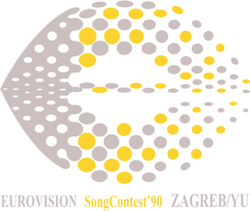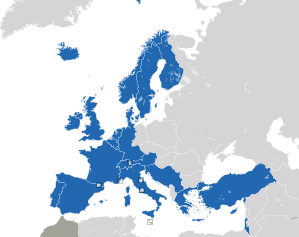
The Eurovision Song Contest 1968 was the 13th edition of the annual Eurovision Song Contest. It took place in London, United Kingdom, following the country's first victory at the 1967 contest with the song "Puppet on a String" by Sandie Shaw. Despite having won for the first time the year before, it was actually the third time that the United Kingdom had hosted the competition, having previously done so in 1960 and 1963, both of which also took place in London. Organised by the European Broadcasting Union (EBU) and host broadcaster British Broadcasting Corporation (BBC), the contest was held at Royal Albert Hall on 6 April 1968, and was hosted by Katie Boyle for the third time. It was notably also the first time that the contest was broadcast in colour.

The Eurovision Song Contest 1966 was the 11th edition of the annual Eurovision Song Contest. It took place in Luxembourg City, Luxembourg, following the country's victory at the 1965 contest with the song "Poupée de cire, poupée de son" by France Gall. Organised by the European Broadcasting Union (EBU) and host broadcaster Compagnie Luxembourgeoise de Télédiffusion (CLT), the contest was held at the Villa Louvigny on 5 March 1966 and was hosted by Luxembourgish television presenter Josiane Chen.

The Eurovision Song Contest 1995 was the 40th edition of the Eurovision Song Contest, held on 13 May 1995 at the Point Theatre in Dublin, Ireland. Organised by the European Broadcasting Union (EBU) and host broadcaster Radio Telefís Éireann (RTÉ), and presented by Mary Kennedy, the contest was held in Ireland following the country's victory at the 1994 contest with the song "Rock 'n' Roll Kids" by Paul Harrington and Charlie McGettigan. It was the third consecutive contest to be held in Ireland – the first and only time in the history of the event that a country has hosted three editions in a row – and the second consecutive edition to be held in the Point Theatre in Dublin.

The Eurovision Song Contest 1994 was the 39th edition of the Eurovision Song Contest, held on 30 April 1994 at the Point Theatre in Dublin, Ireland. Organised by the European Broadcasting Union (EBU) and host broadcaster Radio Telefís Éireann (RTÉ), and presented by Cynthia Ní Mhurchú and Gerry Ryan, the contest was held in Ireland following the country's victory at the 1993 contest with the song "In Your Eyes" by Niamh Kavanagh. It was the first time that any country had hosted two successive editions of the contest, following the previous year's contest held in Millstreet.

The Eurovision Song Contest 1993 was the 38th edition of the Eurovision Song Contest, held on 15 May 1993 at the Green Glens Arena in Millstreet, Ireland. Organised by the European Broadcasting Union (EBU) and host broadcaster Radio Telefís Éireann (RTÉ), and presented by Fionnuala Sweeney, the contest was held in Ireland following the country's victory at the 1992 contest with the song "Why Me?" performed by Linda Martin.

The Eurovision Song Contest 1992 was the 37th edition of the Eurovision Song Contest, held on 9 May 1992 at the Malmö Isstadion in Malmö, Sweden. Organised by the European Broadcasting Union (EBU) and host broadcaster Sveriges Television (SVT), and presented by Lydia Capolicchio and Harald Treutiger, the contest was held in Sweden following the country's victory at the 1991 contest with the song "Fångad av en stormvind" by Carola.
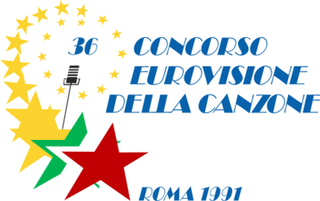
The Eurovision Song Contest 1991 was the 36th edition of the Eurovision Song Contest, held on 4 May 1991 at Stage 15 of the Cinecittà Studios in Rome, Italy. Organised by the European Broadcasting Union (EBU) and host broadcaster Radiotelevisione italiana (RAI), and presented by Gigliola Cinquetti and Toto Cutugno, the contest was held in Italy following the country's victory at the 1990 contest with the song "Insieme: 1992" by Toto Cutugno.

The Eurovision Song Contest 1989 was the 34th edition of the Eurovision Song Contest, held on 6 May 1989 in the Palais de Beaulieu in Lausanne, Switzerland. Organised by the European Broadcasting Union (EBU) and host broadcaster Télévision suisse romande (TSR) on behalf of the Swiss Broadcasting Corporation, and presented by Jacques Deschenaux and Lolita Morena, the contest was held in Switzerland following the country's victory at the 1988 contest with the song "Ne partez pas sans moi" by Céline Dion.

The Eurovision Song Contest 1988 was the 33rd edition of the annual Eurovision Song Contest. It took place in Dublin, Ireland, following Johnny Logan's win at the 1987 contest with the song "Hold Me Now". Organised by the European Broadcasting Union (EBU) and host broadcaster Radio Telefís Éireann (RTÉ), the contest was held at the RDS Simmonscourt on 30 April 1988 and was hosted by Irish broadcaster Pat Kenny and the Miss Ireland 1980 Michelle Rocca, marking the first time since the 1979 contest that two presenters had hosted the contest.

The Eurovision Song Contest 1981 was the 26th edition of the annual Eurovision Song Contest. It took place in Dublin, Ireland, following the country's victory at the 1980 contest with the song "What's Another Year" by Johnny Logan. Organised by the European Broadcasting Union (EBU) and host broadcaster Radio Telefís Éireann (RTÉ), the contest was held at the RDS Simmonscourt on 4 April 1981, and was hosted by Irish television journalist Doireann Ní Bhriain.

The Eurovision Song Contest 1984 was the 29th edition of the Eurovision Song Contest, held on 5 May 1984 in the Théâtre Municipal in Luxembourg City, Luxembourg. Organised by the European Broadcasting Union (EBU) and host broadcaster Radio Télévision Luxembourg (RTL), the contest was held in Luxembourg following the country's victory at the 1983 contest with the song "Si la vie est cadeau" by Corinne Hermès. The event was presented by Désirée Nosbusch, who, at 19 years old, remains the youngest person to have hosted the contest as of 2024.

The Eurovision Song Contest 1974 was the 19th edition of the Eurovision Song Contest, held on 6 April 1974 in the Dome in Brighton, United Kingdom. Organised by the European Broadcasting Union (EBU) and host broadcaster the British Broadcasting Corporation (BBC), and presented by Katie Boyle, this was the fifth time that the United Kingdom had staged the contest.
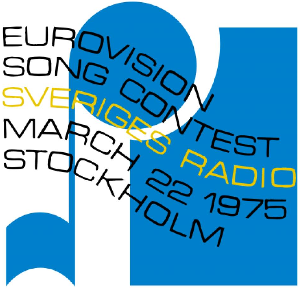
The Eurovision Song Contest 1975 was the 20th edition of the Eurovision Song Contest, held on 22 March 1975 in the Sankt Eriks-Mässan in Stockholm, Sweden. Organised by the European Broadcasting Union (EBU) and host broadcaster Sveriges Radio (SR), and presented by Karin Falck, the contest was held in Sweden following the country's victory at the 1974 contest with the song "Waterloo" by ABBA.

The Eurovision Song Contest 1996 was the 41st edition of the Eurovision Song Contest, held on 18 May 1996 at the Oslo Spektrum in Oslo, Norway. Organised by the European Broadcasting Union (EBU) and host broadcaster Norsk rikskringkasting (NRK) and presented by Ingvild Bryn and Morten Harket, the contest was held in Norway following the country's victory at the 1995 contest with the song "Nocturne" by Secret Garden.
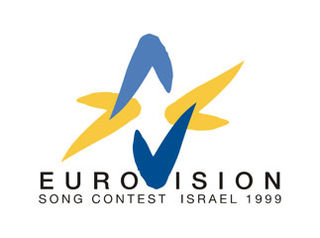
The Eurovision Song Contest 1999 was the 44th edition of the Eurovision Song Contest, held on 29 May 1999 at the International Convention Centre in Jerusalem, Israel. Organised by the European Broadcasting Union (EBU) and host broadcaster Israel Broadcasting Authority (IBA), the contest was held in the country following its victory at the 1998 contest with the song "Diva" by Dana International, and was presented by Dafna Dekel, Yigal Ravid and Sigal Shachmon.

Yugoslavia participated in the Eurovision Song Contest 27 times, debuting in 1961 and competing every year until its last appearance in 1992, with the exceptions of 1977–1980 and 1985. Yugoslavia won the 1989 contest and hosted the 1990 contest.
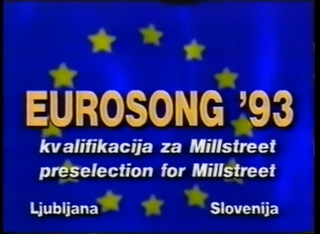
Kvalifikacija za Millstreet was a televised song contest held as a qualifying round for the Eurovision Song Contest 1993. Organised by the European Broadcasting Union (EBU) and host broadcaster Radiotelevizija Slovenija (RTVSLO), the contest was held on 3 April 1993 in Studio 1 of Televizija Slovenija in Ljubljana, Slovenia and presented by the Slovenian television presenter Tajda Lekše.

Helga Vlahović was a Croatian journalist, producer, and television personality, whose career spanned five decades in both SFR Yugoslavia and later Croatia. She was one of the most popular television presenters in the 1980s. Throughout her career, she was also credited as Helga Vlahović Pea and Helga Vlahović Brnobić during the times she was married.
Oliver Mlakar is a Croatian television presenter. Best known for hosting game shows, he was one of the most popular television personalities in SFR Yugoslavia and later Croatia.
Croatia entered the Eurovision Song Contest for the first time as an independent country in 1993. The country's first entry was by Put with the song "Don't Ever Cry".
